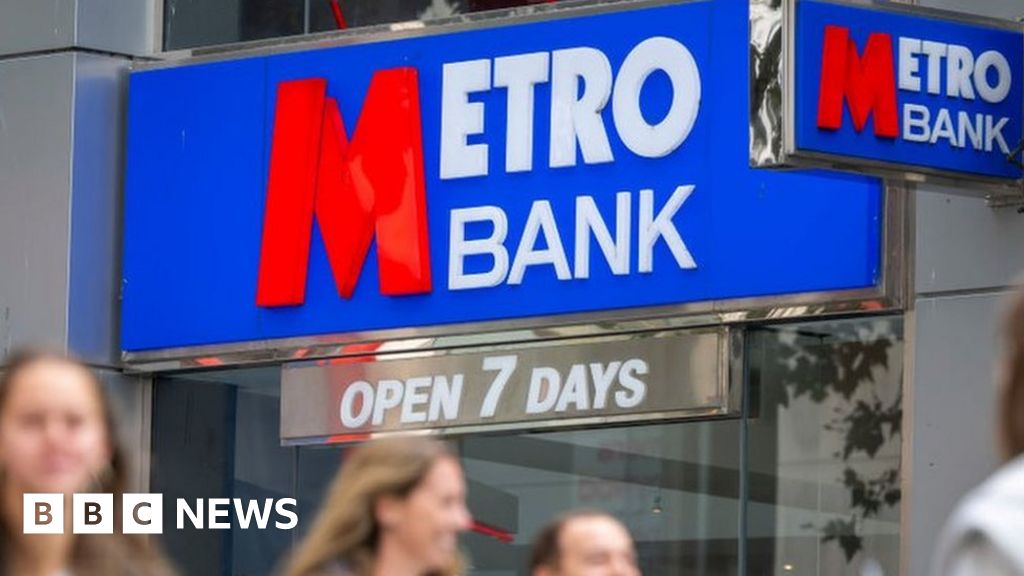- By Tom Espiner
- Business reporter, BBC News
Image source, Getty Images
Metro Bank has said it will review whether to stay open seven days a week as it also revealed plans to cut 20% of its workers.
The struggling lender said the measures were part of a strategy to save around £50m a year.
It said it would not close branches but rival banking group Lloyds announced plans to close a further 45 branches.
The group will close 22 Halifax branches, 19 Lloyds branches and four Bank of Scotland branches.
Metro cuts
Since launching in 2010, Metro Bank sought to differentiate itself from more traditional lenders by staying open for longer.
But on Thursday it also revealed it will shorten its opening hours.
Metro Bank said: “The company is reviewing seven-day opening and extended store hours across the store network and is in discussions with the Financial Conduct Authority about the customer implications of any such changes.”
Meanwhile, more than 850 Metro staff will lose their jobs. The bank currently employs 4,266 people and said that it plans to reduce “roles across the organisation, including at senior leadership level”.
This week, shareholders voted to back a £925m rescue deal aimed at securing the bank’s future.
It has faced challenges in recent years after an accounting scandal. The bank had been struggling to make a profit and in October, reports emerged that it wanted to raise money and refinance some of its debts.
Metro Bank was founded in 2010 by American businessman Vernon Hill in the immediate aftermath of the financial crisis, becoming the first bank to open in the UK in more than a century.
Former Metro Bank chair Vernon Hill, pictured with dog Duffy, founded the bank in 2010
Its branches were branded in red, white and blue, and there were posters of Mr Hill’s Yorkshire Terrier Sir Duffield – who was officially the bank’s “chief canine officer” – advertising its policy of welcoming dog owners.
Metro Bank chose an unusual strategy, building a network of more than 60 physical branches, which opened earlier and closed later than its rivals, at a time when most banks were scaling back their presence on the High Street.
It wanted to be a “challenger” to the main High Street banks and it said that part of its strategy was to help customers avoid “the lunchtime sprint” by being open between 8am and 8pm for the entire week.
On Thursday, the bank said on its website that its branches would be open from 9.30am to 5.30pm but these are just for one day.
“No decisions have yet been made” about opening hours, a spokeswoman said.
Metro Bank said last month that it wanted to make annual cuts of £30m a year but it has now raised that to £50m.
It said it “remains committed to stores and the High Street”, and it still looking for sites for branches in the north of England.
But it will aim to cut costs in part by increasing automation for services and by cutting back-office jobs.
The bank is talking to regulators about the implications for customers of reduced opening hours.
The financing deal, backed by investors earlier this week, means Metro Bank will raise £325m and refinance £600m worth of debt.
Colombian banking billionaire Jaime Gilinski Bacal will become Metro Bank’s controlling shareholder with a 53% stake, and his firm Spaldy Investments will invest £102m in the bank.
Rival Lloyds Banking Group said on Thursday all staff affected by its branch closures would be offered roles at other branches or in a different part of the business, with no compulsory redundancies planned.
Lloyds will close the majority of the 45 branches in March and April next year, with some closing in August and November.
It takes the total of Lloyds group branch closures to 276 this year and next, leaving the group with 515 Lloyds Bank sites, 413 Halifax branches, and 133 Bank of Scotland branches.
High Street banks have been increasingly closing branches as customers move online.
This year, Barclays, NatWest, Virgin Money, Ulster Bank and RBS have all announced closures.
A Lloyds Banking Group spokesman said customers were increasingly using app, online and telephone banking.
Judi Sutherland, 76, who lives in the Scottish Highlands, told the BBC the outage “underlined the vulnerability and dependency of rural communities on such services”.

Robert Johnson is a UK-based business writer specializing in finance and entrepreneurship. With an eye for market trends and a keen interest in the corporate world, he offers readers valuable insights into business developments.








